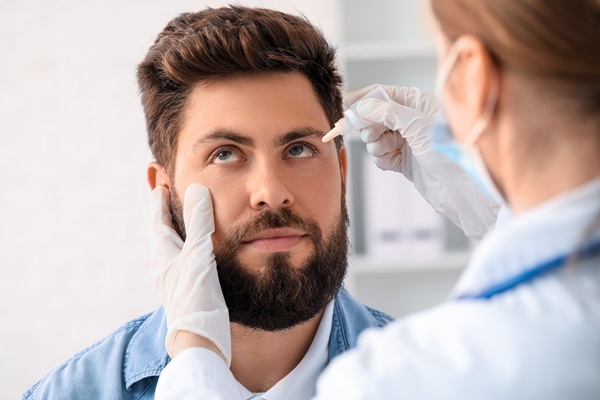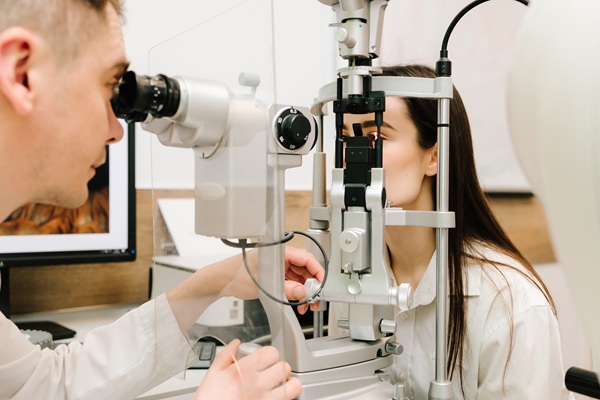What You Need to Know About Diabetic Eye Exams

A diabetic eye exam can be a life and vision saver for a diabetic. Diabetes is a serious disease and one that can be difficult to manage. Medication, proper diet and exercise, and regular medical care can be helpful for controlling blood sugar levels and reducing serious damage to the body. In spite of best efforts, however, sometimes conditions develop that diabetics can find scary and confusing. Diabetic retinopathy is one that can be confirmed in a thorough exam.
What causes diabetic retinopathy?
Diabetic retinopathy is a disease in which the optic nerve to the retina begins to deteriorate. High blood sugar can weaken and thin the blood vessels in the eye. High blood pressure, frequently a side effect of high blood sugar, can cause bleeding within the eye as the pressure pushes it through the thin vessel walls. This can cause darkening of vision and untreated, can lead to glaucoma or cataracts or make those conditions worse.
What are the warning symptoms?
There are several things that can lead a person to suspect they have diabetic retinopathy. Although some are also symptoms of other things, a person with diabetes should never overlook any of these:
- Blurred vision (may also be a sign of uncontrolled sugars)
- Dark or blank areas in the field of vision or a change in color perception
- Flashers and floaters or small moving objects in the field of vision
- Sudden onset of partial or complete vision loss
- Difficulty focusing, even with glasses
How can a diabetic eye exam help?
An optometrist can perform a series of tests to see how severe the damage is and make an assessment as to possible treatments. The first thing a doctor is likely to do is to dilate the eyes so that the back of the retina can be seen. A special dye is injected that makes the blood glow, rendering it more visible in the pictures that are taken. The doctor typically also checks the pressure in the eye as a baseline to monitor the possible complication of glaucoma. A standard vision test may also be given to judge progress or deterioration of vision during treatments.
What treatments can the doctor perform?
Focus or scatter laser treatments may be administered to help cauterize active bleeds and shrink swollen vessels. There may be injections given in the eye that can help to “dry up” or dissolve the bleeding. If none of these treatments clear the vision field, a vitrectomy may be performed. This procedure essentially removes the debris-filled fluid and scar tissue in the eye and replaces it with clean fluid. The recovery period can be around two weeks.
Conclusion
Prevention through maintaining lower blood sugar levels and getting blood pressure down so it doesn’t cause bleeding in the eye are critical steps to avoiding this potentially blinding disease. Make sure to have a regular diabetic eye exam and go in as soon as possible if any of the above symptoms occur. This will give you the best chance of getting on top of the problem.
Request an appointment here: https://brighteyesny.com or call Bright Eyes Optometry at (914) 730-9574 for an appointment in our New Rochelle office.
Check out what others are saying about our services on Yelp: Read our Yelp reviews.
Recent Posts
Dry eye treatment can significantly improve comfort, vision, and overall quality of life for individuals dealing with this common yet often frustrating condition. Dry eye occurs when the eyes do not produce enough tears or when the tears evaporate too quickly, leading to symptoms such as burning, redness, blurred vision, and a gritty sensation. Effective…
Ophthalmologist and optometrists are two of the main eye care professionals. Both play an important part in helping you maintain the health and function of your eyes. However, while each type of eye doctor provides vision care, knowing the care you need can be confusing. Choosing the appropriate eye care provider depends on individual needs,…
Sunglasses have become a part of many people's wardrobes; however, they are also a great tool for protecting the eyes. Along with playing a large role in our daily lives, eyes are also sensitive to many things—sunlight being one of them. It is easy for one's eyes to sustain damage from direct sunlight exposure. Thankfully,…
A comprehensive eye exam does more than assess vision; it can also reveal early signs of various health conditions. Many systemic diseases affect the eyes before other symptoms appear, making regular exams essential to overall health care. Optometrists use advanced diagnostic techniques to detect conditions beyond vision problems, allowing for early intervention and treatment.Routine eye…


